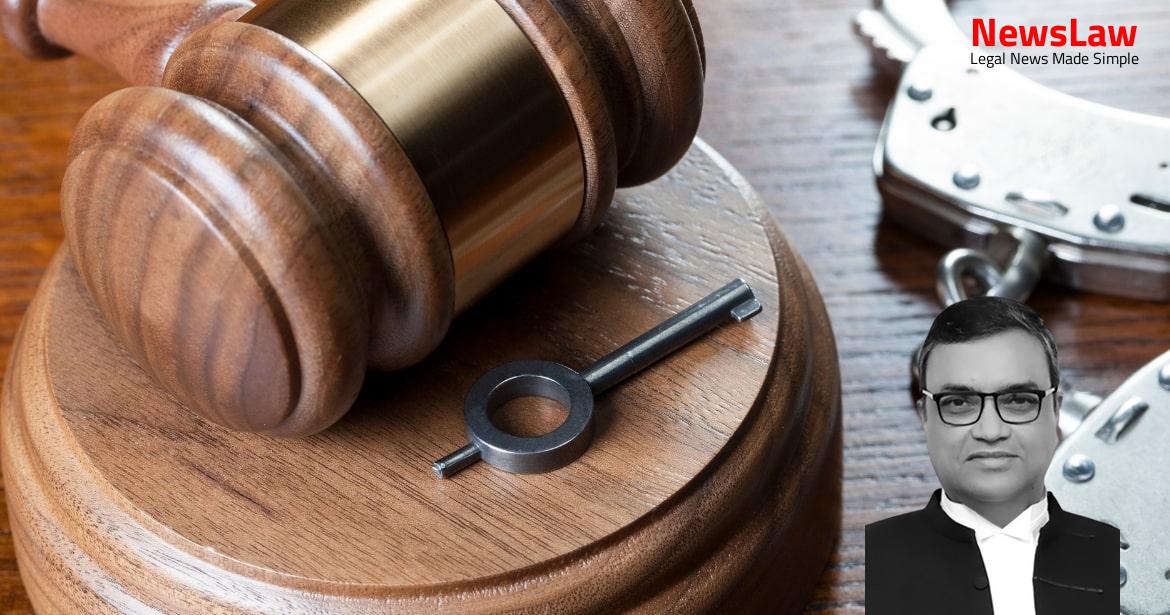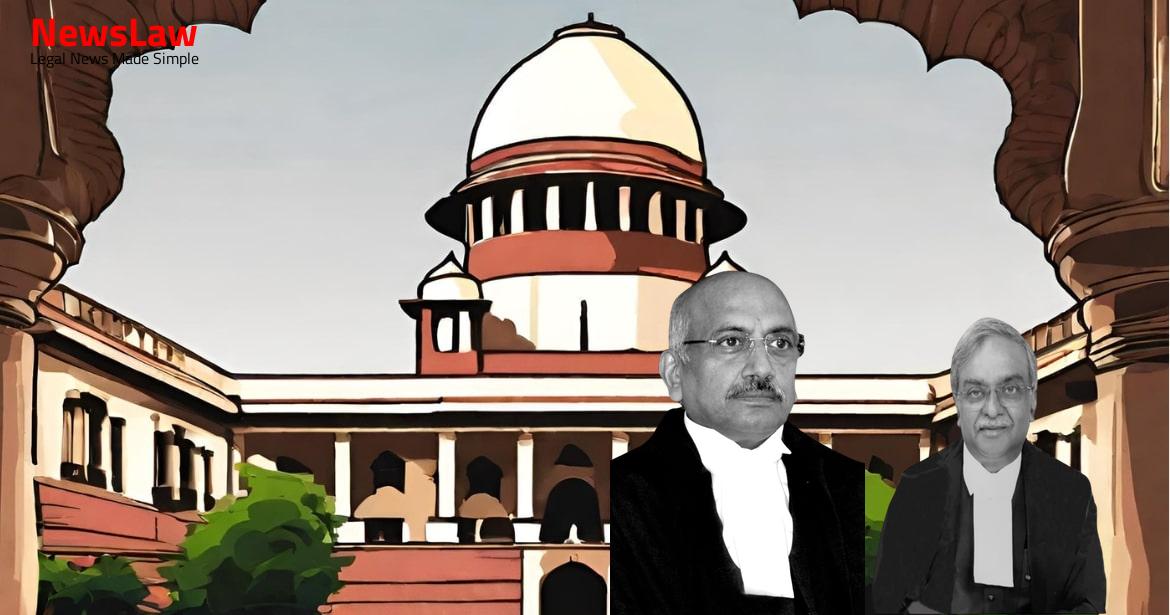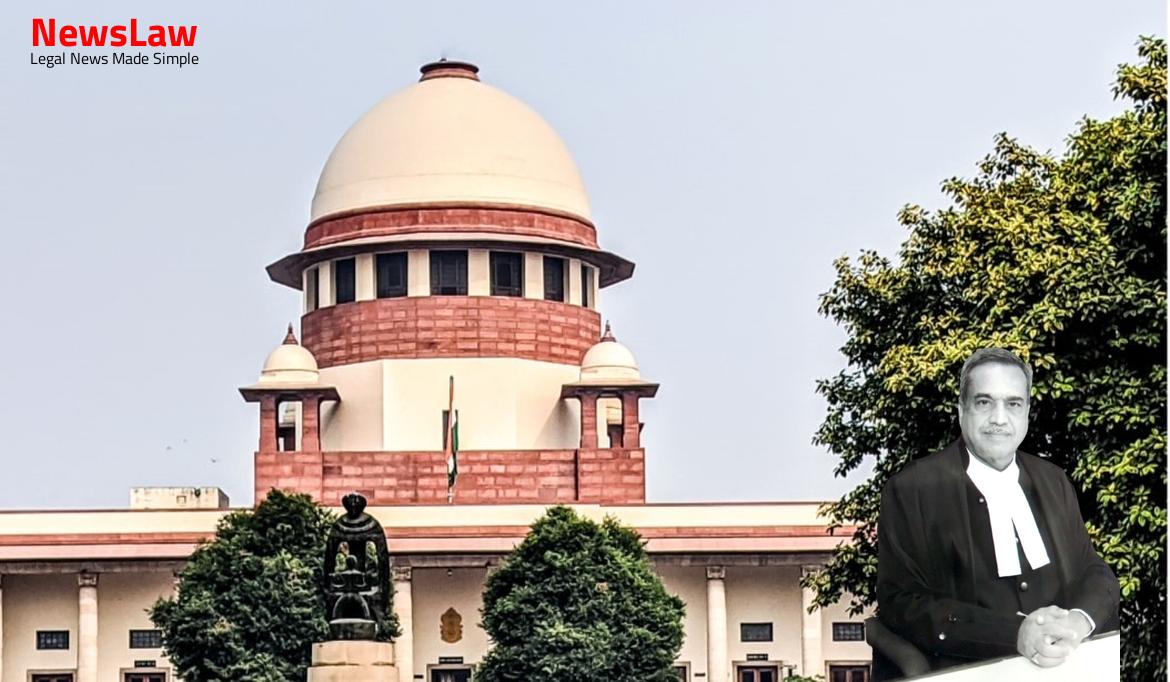In a recent legal case, A-1 and A-2 appealed against the State of India’s judgment under the POCSO Act. The High Court examined the evidence meticulously and overturned the convictions imposed by the Special Court. Learn more about the details and implications of this crucial decision.
Facts
- The High Court dismissed the criminal appeal under section 374(2) of the Cr.P.C. carried by the appellants from the judgment and order dated 22 November, 2021 of the Special Court under the POCSO Act.
- The Special Court convicted A-1 under section 12 of the POCSO Act and sentenced him to three (3) years’ rigorous imprisonment with a fine of Rs. 30,000/-, in default to suffer six (6) months’ rigorous imprisonment.
- Both A-1 and A-2 were convicted and sentenced as mentioned in the judgment.
- The challenge to the judgment and order proved to be unsuccessful.
- The High Court found that the findings by the Special Court did not justify any intervention and that the appeal lacked merit.
- The prosecution examined twelve witnesses in the case.
- The second incident occurred on 14 February, 2018, when the victim was called by A-2 through a seventh-grade student.
- A-2 faced charges under Section 506 of the Indian Penal Code.
- After examination under Section 313 of the Cr.P.C., both A-1 and A-2 denied the allegations.
- The First Information Report was registered on 19 February, 2018, against A-1, A-2, and A-3 under sections 11(i) and 12 of the POCSO Act.
- Defense tried to establish a case of false implication of A-1 and A-2 based on a previous incident.
- Victim’s family learned of her distress through her maternal aunt, resulting from the incidents.
- Victim’s father approached the school Headmaster seeking intervention.
- Charges under sections 11(i) and 12 of the POCSO Act were framed against A-1.
- The victim was coerced into accepting flowers and chocolate by A-1 in the first incident.
Also Read: Analysis of Agency Relationships in Taxation
Issue
- The issues for decision are whether the evidence is sufficient to convict A-1 and A-2
- Revisiting the law regarding the weight of victim testimony in sexual offense cases
- Classification of oral testimony into three categories: wholly reliable, wholly unreliable, and neither wholly reliable nor wholly unreliable
- Difficulty in cases falling in the third category requiring the Court to look for corroboration
- Importance of reliable testimony, direct or circumstantial, in such cases as per the rule of prudence
Also Read: Land Auction Dispute Resolution
Arguments
- The defense counsel argued that the prosecution failed to prove the case beyond a reasonable doubt, and the appellants should have been acquitted.
- Inconsistencies and contradictions in the oral evidence were not given due consideration by the courts, leading to a skewed judgment.
- The defense highlighted contradictions in the victim’s testimony, questioning the presence of sexual intent in the actions attributed to the accused.
- The reliability of the victim’s evidence was brought into question by the defense, suggesting it should not have been given credence.
- It was pointed out that there was a lack of corroborative witness testimony regarding the alleged actions of the accused towards the victim.
- Learned senior counsel for the State supported the judgment of conviction and sentence by the Special Court.
- The High Court examined the evidence meticulously to agree with the Special Court’s decision.
- Teachers hold immense trust and responsibility in a student’s life and play a crucial role in shaping their future.
- The importance of teachers as guardians entrusted with the care of children was emphasized.
- The counsel emphasized that the desecration of an educational institution through sexual harassment is morally reprehensible and undermines the sanctity of education.
- Contradictions in depositions and flaws in the impugned decisions were highlighted by the counsel supporting the appeal for acquittal of A-1 and A-2.
- No interference case was presented by A-1 and A-2, thus urging the appeal to be dismissed.
Also Read: Analysis of Bail Conditions in Criminal Appeal No. INSC 48/2024
Analysis
- The prosecution’s case lacks substantial evidence and is marked by inconsistencies and inadequacies.
- The witness testimonies, including the victim’s, are contradictory and unreliable, casting doubt on the veracity of the allegations.
- Key witnesses, such as P.W.10, were not adequately examined or their testimonies were not consistent with the prosecution’s narrative.
- The Court emphasizes the need for a high-quality and unassailable witness account to convict the accused without corroboration.
- The Court finds discrepancies in the prosecution’s version, particularly regarding the sequence of events and witness testimonies.
- The Court highlights the importance of scrutinizing the evidence thoroughly and ensuring a consistent and credible account from witnesses.
- The evidence of the prosecutrix in the case showed several lacunae and flaws.
- The quality of the prosecutrix’s evidence was not of sterling quality and did not inspire confidence.
- As per the precedent set in Krishan Kumar Malik v. State of Haryana, the victim’s solitary evidence in sexual offences is usually sufficient for conviction.
- However, in this case, the prosecutrix’s testimony was found unreliable and insufficient due to identified flaws and lacunae.
- The court concluded that the appellant could not be held guilty based on the prosecutrix’s evidence.
- Reputation of a teacher is earned through years of service and false accusations can have long-lasting effects
- Accusations of sexual harassment, especially involving minors, are grave and have far-reaching consequences
- Insufficient evidence in the present case leads to giving the benefit of doubt to the accused A-1
- Prosecution failed to prove criminal intimidation for accused A-2
- Conviction under section 506 I.P.C. not justified for accused A-2
- Based on discussions and acts attributed, conviction under section 506 I.P.C. not warranted for accused A-2
- First issue answered in negative, second question does not require an answer
Decision
- The appeal has been allowed.
- The convictions of A-1 and A-2 have been set aside.
- The sentences imposed on A-1 and A-2 by the Special Court and affirmed by the High Court have been overturned.
Case Title: NIRMAL PREMKUMAR Vs. STATE REP. BY INSPECTOR OF POLICE (2024 INSC 193)
Case Number: Crl.A. No.-001098-001098 / 2024



